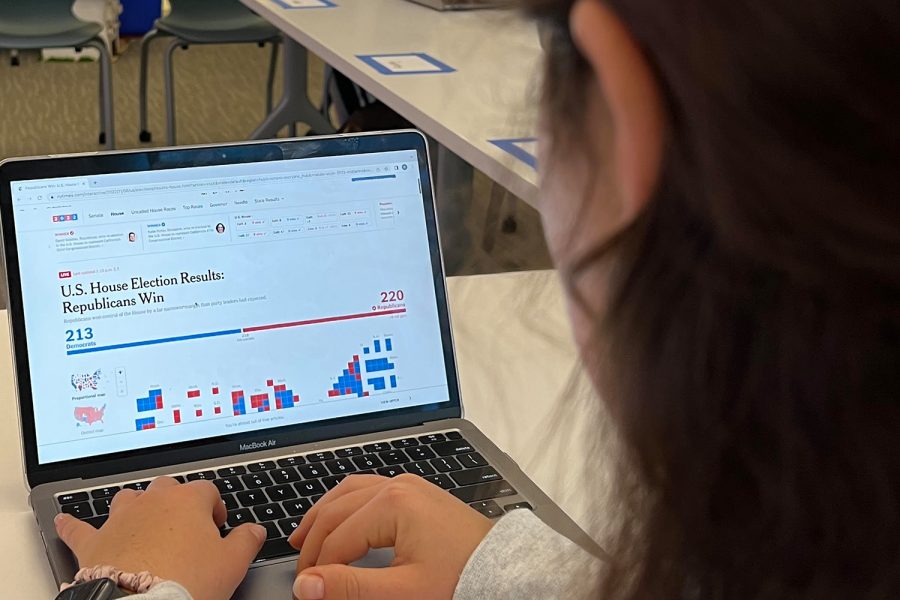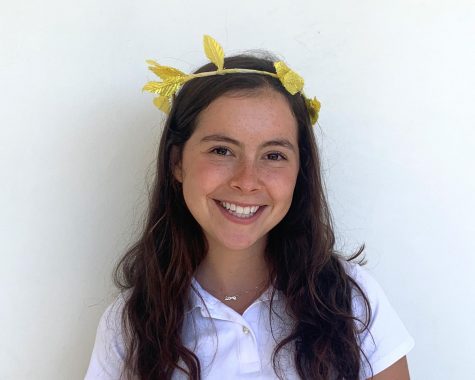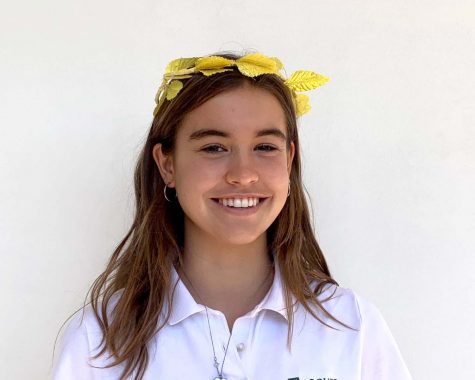‘Young people will decide this election’: Archer students learn about their impact on 2022 midterm elections
Photo credit: Greta Irvine
The New York Times tracks the 2022 midterm election results. Democrats have secured control over the Senate, and Republicans have secured control over the House of Representatives elections with six seats still not called.
November 29, 2022
According to the 26th Amendment, American citizens 18 years and older are granted the right to vote. Tuesday, Nov. 8, marked Election Day in the United States, and all across the country individuals went to the polls to cast their vote. At Archer, this day marked an opportunity for a few seniors to vote for the first time and for the majority of the student body to learn about the importance of the 2022 midterm elections.
Both the upper and middle school listened to a 20-minute presentation from history teachers Meg Shirk, Beth Gold and Nick Graham about the history of the midterm elections, their significance and the ways students can get involved and educate themselves about politics.
“This [election] is particularly important,” Shirk said. “One of the reasons is because of the unique political climate. Inflation is at record high, so a lot of voters are really struggling to make ends meet, and they’re looking for relief and looking for leadership that will help address inflation.”
A schoolwide survey sent by Graham demonstrated that the issue that Archer students are most concerned about is the overturning of Roe v. Wade. According to the Center for American Women and Politics, during the 2022 midterm elections, women registered and voted at higher rates than ever before. Political activist Charlotte Tragos (’23) is in Shirk’s Advanced Study Voice of Democracy course, which is focused on political activism and the United States’ democracy. Tragos agrees that abortion is the issue affecting the midterms the most.
“Abortion will be the most major issue in this race,” Tragos said. “Listen to the voters, not the pundits. Young people are showing up because their rights are being stripped. Young people have less freedom than their parents and grandparents. We are angry and empowered. Young people will decide this election.”
According to FiveThirtyEight, abortion made it onto five states ballots – Michigan, Vermont, California, Kentucky and Montana – and with votes still being counted, abortion rights supporters appear poised to sweep the board. Tragos said that abortion is not the only issue igniting voters; both inflation and gun violence are equally important topics that voters are eager to voice their opinion on.
“This is a generation has grown up with school shootings, lost reproductive freedoms and faced true political instability,” Tragos said. “We’ve never seen this kind of empowered and politically impacted electorate before.”
According to NPR, reporters were unsure whether there was going to be a red or blue wave. However, NPR reporter John Della Volpe said she was extremely confident that there was going to be a Generation Z wave. Additionally, according to CIRCLE Research at Tufts University, more young voters under 25 registered to vote this midterm election than in the record-breaking 2018 midterm election. After the New York Times began calling states, it began clear that Democratic voters showed up to the polls forcing a “red trickle” rather than a “red wave.”
In Florida’s 10th Congressional District, 25 year-old Democrat Maxwell Alejandro Frost became the first member of Generation Z ever elected to Congress. Senior Presley Wernick is also in Shirk’s Voice of Democracy course and said that the 2022 midterm elections have marked history for her generation.
“I think it’s very important to keep a close eye on [the midterms] because we are soon to be the generation in power, and as you can in this midterms, the first Gen Z person was elected into the house,” Wernick said. “This is crazy. It’s our time to be in politics. It’s important to focus on what is going on because, to fix the past mistakes, we need to be well informed. So, this election is critical.”
Over the past two weeks, each Advanced Study Voice of Democracy student analyzed one state’s senate race, exploring both candidate’s unique experiences and the policies they support. On Election Day, students presented their senate races to their class and engaged in civil discourse to fully understand each student’s research.
“I think the first step is education. I hope students have access to courses that will teach them civic education and how to get involved in democratic systems,” Shirk said. “But, if they don’t have that opportunity, I think it’s going to have to fall on themselves to educate themselves on how elections work.”










